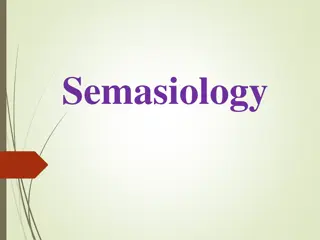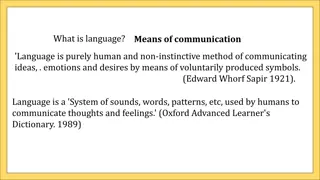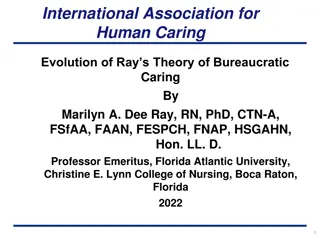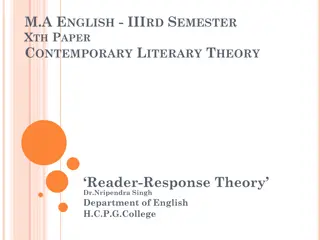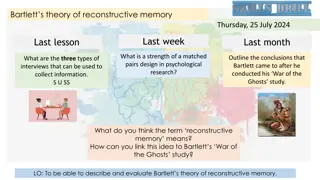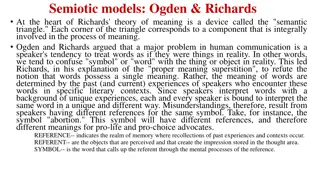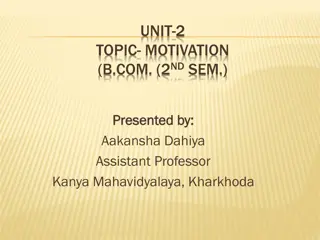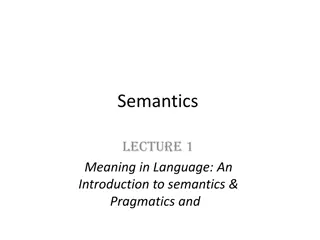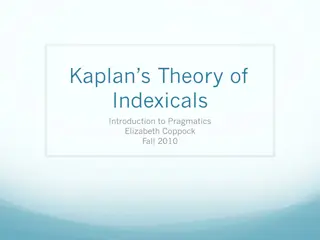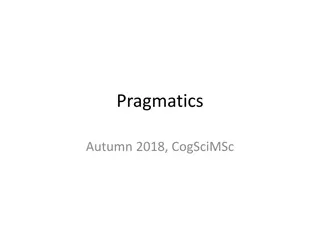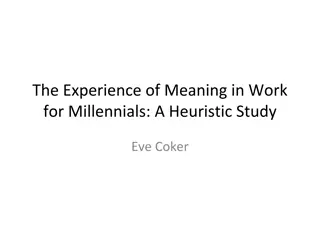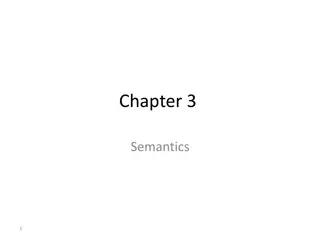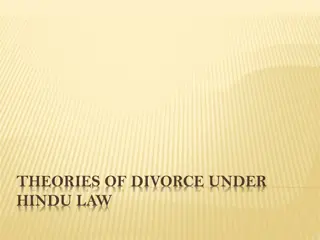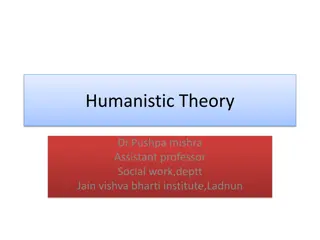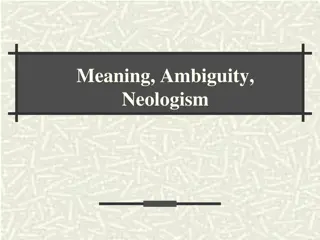Ginzburg Landau phenomenological Theory
The Ginzburg-Landau phenomenological theory explains superconductivity and superfluidity as distinct thermodynamic phases. It focuses on phase transitions characterized by singularities in specific heat at the transition temperature. Derived from BCS theory, it quantifies condensation energy, emphas
1 views • 38 slides
Understanding Semasiology: The Study of Word Meaning
Semasiology is a branch of linguistics focused on the meaning of words. It delves into various aspects of lexical meaning, semantic development, polysemy, and semantic structure. Through exploring types of word meanings and semantic changes, semasiology helps us comprehend the intricate nuances of l
4 views • 19 slides
Crystal Field Theory in Transition Metal Complexes
Crystal Field Theory (CFT) explains the colors and magnetic properties of transition metal complexes. It focuses on the energy changes in d-orbitals of metal ions caused by surrounding ligands. This theory, developed in 1929, provides insights into the bonding interactions in complex compounds. The
10 views • 44 slides
Understanding Semasiology: The Study of Meaning in Language
Semasiology, a branch of lexicology, focuses on the study of meaning in language through different approaches such as the referent approach and functional approach. The referent approach links the sound form with the concept denoted by the word, while the functional approach emphasizes the relations
2 views • 15 slides
Understanding Social Learning Theory and the Power of Example
Social Learning Theory, introduced by Bandura, emphasizes learning through observation and modeling. It explores how individuals acquire behavioral dispositions, trial-and-error experiences, and the impact of stimuli in the environment. The theory focuses on the importance of attention, retention, a
1 views • 17 slides
Evolution of Mathematical Theories and Proof Systems
Development of mathematical theories such as model theory, proof theory, set theory, recursion theory, and computational complexity is discussed, starting from historical perspectives with Dedekind and Peano to Godel's theorems, recursion theory's golden age in the 1930s, and advancements in proof t
1 views • 29 slides
Introduction to Organizational Behavior: Management Theories and Practices
Explore the evolution of organizational behavior from early management theories to contemporary practices. Understand the historical foundations and relevance of management theory in shaping workplace dynamics. Delve into key concepts like Scientific Management, Administrative Management, Bureaucrat
1 views • 28 slides
Theories on the Origin of State: Divine, Force, Patriarchal, and More
Various theories such as Divine Origin, Force Theory, Patriarchal Theory, and others explain the origin of the state. Divine theories attribute state creation to God, while Force Theory emphasizes the strong subjugating the weak to establish authority. Each theory offers unique perspectives on the h
1 views • 24 slides
Understanding Language: An Overview of Linguistics
Linguistics is the scientific study of language, a complex system of sounds, words, and patterns that humans use to communicate thoughts and feelings. Language consists of phonology (sounds), morphology (words), syntax (sentences), semantics (meaning), and pragmatics (contextual meaning). Different
0 views • 42 slides
Understanding Forgetting: Theories and Influence on Memory Recall
Forgetting is a complex phenomenon influenced by theories such as Decay Theory, Interference Theory, and Motivated Forgetting. The Ebbinghaus forgetting curve highlights how memories fade over time. Decay Theory suggests memories decay over time, while Interference Theory explains how old and new me
0 views • 25 slides
Psychological Theories of Criminality: Understanding the Roots
Psychological theories of criminality delve into the association between intelligence, personality, learning, and criminal behavior. Major theories include Psychodynamic Theory by Freud, Behavioral Theory by Bandura, and Cognitive Theory by Kohlberg. These theories explore how unconscious mental pro
1 views • 20 slides
Austin's Theory of Law by Rinkey Sharma: An Overview
Austin's Theory of Law, presented by Rinkey Sharma, delves into the Imperative Theory of Law as proposed by Austin, known as the father of English jurisprudence. It explores General and Particular Jurisprudence, Austin's definition of law, and the elements of positive law, emphasizing the concepts o
0 views • 11 slides
Evolution of Bureaucratic Caring Theory in Nursing
Discussion of the Theory of Bureaucratic Caring by Marilyn A. Dee Ray, focusing on the systematic integration of purposeful concepts and the development process of the BCT model. The research explores the meaning of caring within institutional culture using methodologies like ethnography and phenome
0 views • 29 slides
Understanding the Theory of Firms: Neoclassical vs. Modern Approaches
The theory of firms is explored through the Neoclassical and Modern perspectives. Neoclassical theory focuses on profit maximization, while Modern theory delves into managerial, principal-agent, and transaction cost theories. The discussion covers criticisms of Neoclassical theory and the essential
1 views • 79 slides
Understanding Reader-Response Theory in Literary Criticism
Reader-response criticism in literary theory emphasizes the reader's role in interpreting and creating meaning from a literary work. This theory contrasts with approaches focusing solely on the author or text, highlighting the active engagement of readers in shaping the significance of a piece of li
1 views • 7 slides
Understanding Bartlett's Theory of Reconstructive Memory
Bartlett's theory of reconstructive memory explores how memories are reconstructed based on past experiences, beliefs, and expectations. The War of the Ghosts study demonstrated that memory is an active process where information is inaccurately recalled and reconstructed. Social and cultural influen
3 views • 20 slides
Theories of Causation in Psychological and Social Sciences
Overview of theories of causation categorized into psychological, social psychological, and sociological perspectives. Psychological theories focus on instinctive, biological, and psychological qualities of abusers, including Attachment Theory, Psychodynamic Theory, Social Learning Theory, and Situa
0 views • 15 slides
Understanding Political Theory through a Contextual Approach
Exploring G.H. Sabine's perspective on political theory through a contextual approach, emphasizing the importance of historical context and societal influences. Sabine argues that while political theory evolves with its contemporary politics, it should be analyzed within its specific time and social
0 views • 9 slides
Semiotic Models: Theory of Meaning by Ogden & Richards
Ogden & Richards proposed the theory of meaning through the "semantic triangle," emphasizing the role of past experiences in interpreting words. They highlighted the importance of distinguishing symbols from the actual referents to avoid misunderstandings. Additionally, Richards discussed the effect
0 views • 14 slides
Evolution of Light Theory: From Wave Theory to Quantum Theory
At the turn of the century, the discovery of the photoelectric effect challenged the wave theory of light, leading to the development of the quantum theory by Max Planck and Albert Einstein. This new theory introduced the concept of discrete energy units known as quanta, bridging the gap between wav
1 views • 62 slides
Understanding Motivation Theories: Key Concepts and Implications
Motivation is crucial for inspiring individuals to achieve common goals within an organization. This presentation delves into the definition, meaning, and various theories of motivation such as Maslow's hierarchy of needs, Herzberg's motivator-hygiene theory, McGregor's X and Y theory, and Ouchi's Z
5 views • 18 slides
Dp-branes, NS5-branes, U-duality, and M-Theory Overview
Overview of Dp-branes, NS5-branes, and U-duality derived from nonabelian (2,0) theory with Lie 3-algebra. Introduction to M-theory, including M2-branes and M5-branes in the strong coupling limit. Discussion on BLG theory, Lorentzian Lie 3-algebra, and the ABJM theory for M2-branes.
1 views • 32 slides
Meaning and Meaning-making in Big Q Qualitative Research
Qualitative research explores different understandings of meaning and meaning-making, providing researchers with tools, techniques, and values. Big Q qualitative research focuses on the active role of words in creating meaning beyond reflecting experiences. This lecture series delves into the founda
0 views • 20 slides
Understanding Time-Independent Perturbation Theory in Quantum Mechanics
Perturbation theory is a powerful tool in solving complex physical and mathematical problems approximately by adjusting solutions from a related problem with known solutions. This theory allows for more accurate approximate solutions by treating the difference as a small perturbation. An example inv
0 views • 19 slides
Ethical Theories: Divine Command vs. Virtue Theory Explained
Divine Command Theory asserts that morality is derived from God's commands, contrasting with Virtue Theory which focuses on developing moral virtues to achieve human flourishing and excellence. Divine Command Theory relies on religious texts, while Virtue Theory emphasizes the cultivation of virtues
0 views • 24 slides
Understanding Fermi Liquid Theory in Interacting Fermion Systems
Fermi liquid theory, also known as Landau-Fermi liquid theory, is a theoretical model that describes the normal state of metals at low temperatures. Introduced by Landau and further developed by Abrikosov and Khalatnikov, this theory explains the similarities and differences between interacting ferm
0 views • 23 slides
Introduction to Meaning in Language: Semantics & Pragmatics
Meaning in language is explored in this introductory lecture, covering aspects such as communication, semiotics, linguistic channels, and approaches to studying meaning. The process of encoding messages, signal transmission, noise interference, and decoding are discussed within the context of commun
0 views • 19 slides
Computational Learning Theory: An Overview
Computational Learning Theory explores inductive learning algorithms that generate hypotheses from training sets, emphasizing the uncertainty of generalization. The theory introduces probabilities to measure correctness and certainty, addressing challenges in learning hidden concepts. Through exampl
0 views • 43 slides
Automata Theory and Theory of Computation Overview
This course overview covers concepts in automata theory and theory of computation, including formal language classes, grammars, recognizers, theorems in automata theory, decidability, and intractability of computational problems. The Chomsky hierarchy, interplay between computing components, modern-
0 views • 42 slides
Understanding Kaplan's Theory of Indexicals
Kaplan's Theory of Indexicals explores the concept of indexicality in language, defining indexicals as words whose referents depend on the context of use. The theory distinguishes pure indexicals from demonstratives and emphasizes the directly referential nature of indexicals. By delving into altern
0 views • 30 slides
Understanding Pragmatics in Language Analysis
Pragmatics in language analysis involves studying utterance meaning beyond semantics, focusing on context-dependence, complete context-dependence, and pragmatic knowledge. Basic concepts include semantics, discourse, Grice's Relevance Theory, Speech Acts, Metaphor Theory, and more. Truth-conditional
0 views • 47 slides
Theories of Interest in Microeconomics II
Explore various theories of interest in economics, including the Classical Theory, Liquidity Preference Theory by Keynes, Productivity Theory, Abstinence Theory, Time-Preference Theory, Fisher's Time Preference Theory, and the Loanable Fund Theory. These theories offer different perspectives on the
0 views • 6 slides
Understanding Meaning in Work for Millennials: A Heuristic Study
This study explores the experience of meaning in work for millennials, considering its impact on organizational commitment, change, vision-championing, and leadership. It aims to contribute to the existing knowledge base by examining how millennials perceive and create meaning in their work, using q
0 views • 14 slides
Exploring the Evolution of Atomic Theory
Delve into the historical journey of atomic theory starting from Democritus and Aristotle's views to modern advancements proving some aspects of Dalton's theory incorrect. Learn about key laws and theories such as the Particle Theory of Matter, Dalton's Atomic Theory, and JJ Thomson's discoveries, s
0 views • 30 slides
Understanding Semantics: Exploring Types and Dimensions of Meaning
Explore the complexities of semantics by delving into the types and dimensions of meaning. From descriptive to non-descriptive meaning, learn how the normality profile of linguistic items contributes to their overall meaning. Distinguish between semantic and grammatical anomalies and discover the nu
0 views • 32 slides
Theories of Divorce Under Hindu Law
Exploring the meaning of divorce under Hindu law, this article discusses the theories of divorce, including Fault Theory, Mutual Consent Theory, and Irretrievable Breakdown of Marriage Theory. These theories reflect the evolution of the concept of divorce within the Hindu Marriage Act of 1955, allow
0 views • 9 slides
Understanding Humanistic Theory of Personality and its Key Concepts
Humanistic theory emphasizes the active role individuals play in their behavior, with proponents like Abraham Maslow and Carl Rogers. It focuses on humanistic psychology, existentialism, and humanism, emphasizing personal meaning and values. The theory argues for the innate goodness of individuals a
0 views • 8 slides
Exploration of Literary Theory: Death of the Author in "Hag-Seed" and "Team Gonzalo
Explore the concept of the death of the author in literature through the works "Hag-Seed" and "Team Gonzalo." Delve into Roland Barthes' theory, which separates the author from the text, emphasizing the role of the reader in interpreting meaning within the narrative. Witness how this theory is demon
0 views • 7 slides
Understanding Ambiguity in Translation Theory
Exploring the complexities of ambiguity in translation theory, this content delves into the nuances of meaning, neologisms, and the challenges faced by translators in deciphering text. It discusses the various types of ambiguity, such as lexical and semantic, highlighting their impact on language in
0 views • 27 slides
Macromechanical Analysis of Lamina and Tsai-Hill Failure Theory Overview
The Tsai-Hill failure theory is based on the strengths of a unidirectional lamina, incorporating longitudinal and transverse tensile and compressive strengths, as well as in-plane shear strength. This theory, derived from the distortion energy theory, provides criteria for determining lamina failure
0 views • 15 slides



